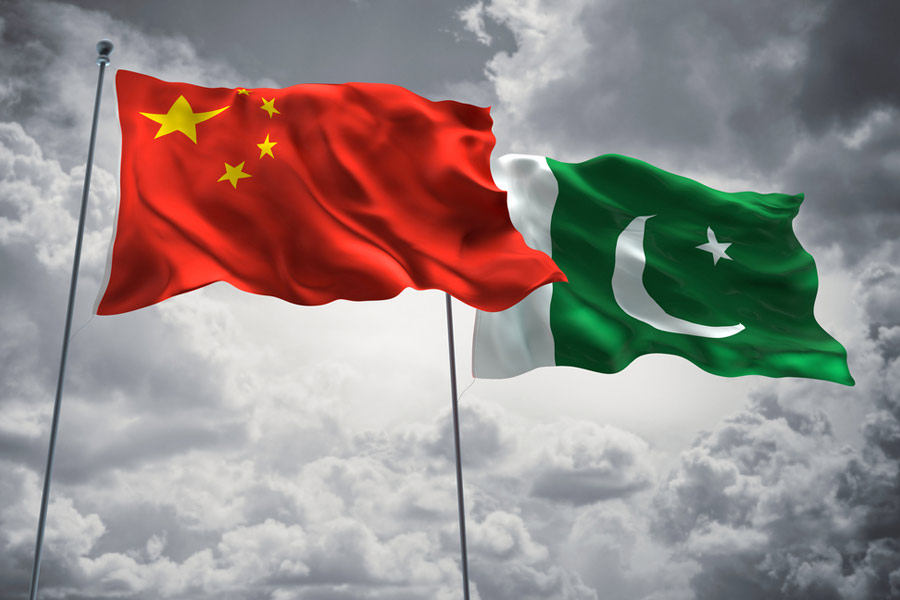After cash-strapped Pakistan secured a new $7 billion (€6.5 billion) bailout package from the International Monetary Fund (IMF) in July, Islamabad has started talks with Beijing on reprofiling billions in Chinese debt as it seeks to enact economic reforms.
On the table are proposals to delay at least $16 billion in energy sector debt to China, along with extending the term of a $4 billion cash loan facility due to depleting foreign exchange reserves.
Last week, Pakistani Finance Minister Muhammad Aurangzeb was in Beijing to present proposals on extending the maturity of debt for nine power plants built by Chinese companies under the multibillion-dollar Pakistan China Economic Corridor (CPEC).
On Friday, Prime Minister Shehbaz Sharif told a federal cabinet meeting that he had written a letter to the Chinese government requesting debt reprofiling, Pakistan’s Dawn newspaper reported.
Reprofiling debt differs from restructuring debt in that the amount is not cut, rather, the due date for repayment is extended.
Islamabad is under immense pressure to renegotiate the expensive agreements with power producers, primarily Chinese companies, to bring down electricity prices.
Since CPEC was signed in 2015 and became one of largest components of China’s Belt and Road Initiative (BRI), Beijing has poured billions of dollars into developing infrastructure in Pakistan.
The value of CPEC projects comes in a $65 billion, with the primary goal of building a shipping connection for Chinese goods from Gwadar port on the Arabian Sea over the mountain border into China’s Xinjiang region.Power production in focus
CPEC has also earmarked billions of dollars in energy infrastructure development in Pakistan.
Azeem Khalid, an expert on Chinese investment in Pakistan, told DW, that the China-funded power plant development has exacerbated Pakistan’s economic difficulties.
“Rather than establishing government-owned power plants, Pakistan allowed Chinese companies to operate as Independent Power Producers (IPP), leading to capacity payments regardless of production. This essentially leads to the population paying for power they aren’t using,” Khalid said.
Overburdened by Chinese loans
According to data from 2022, Pakistan has $26.6 billion (€24.6 billion) worth of Chinese debt, more than any other country in the world.
Safiya Aftab, an Islamabad based economist, told DW that the interest rates on Chinese loans are not concessional and come in at around 3.7%.
“These loans were given for infrastructure, which in theory is supposed to start generating returns. The main issue in my opinion is Pakistan’s poor absorption capacity. The government was not able to progress on projects according to schedule,” she said.
Analyst Khalid believes these loans “are challenging to repay due to exorbitantly high interest rates, which exceed the payment capacity of the government.”
“The more relaxations and extensions available, the better it is for Pakistan. China, aware of Pakistan’s financial struggles, often provides breathing space but occasionally leverages this debt for its interests,” said Khalid.
Analysts say that the CPEC loans were initially presented as the cheapest option for international loans, but it later emerged that they would be far more expensive to pay back than expected.
“The agreements, heavily favoring China, were poorly negotiated, resulting in the project being over-promised and under-delivered. The public and media were misled by the then minister of planning and his team to portray CPEC as a significant economic game-changer for Pakistan and the region,” Khalid said.
Economist Kaiser Bengali is of the view that changing the payment structure on Chinese debt “is only a temporary fix, which also depends on graciousness from the Chinese side, even if re-profiling and rollovers on loans from China have helped Pakistan fulfill its external financing needs several times in the past.”
“The Chinese debt is huge and rollover is the only but temporary option. “The huge debt pile is crushing the economy,” he told DW.
“This is getting more complex, for how long China will roll over these debts, as they have their own bottom lines for these loans in their business projects. They lend to many countries and don’t want to set a precedent of delaying and renegotiating projects as it will affect their interests,” he added.

